Fine Art Studios
Please ensure you have enrolled in the Fine Art Studio course in enrolment online.
You will not need to preference this course: students will be allocated to their home studios course relevant to their year level.
(Note: There is a separate page for Workshop classes and a separate page for ART: History+Theory+Cultures classes).
The Fine Art Studios are offered under the following course codes:
Fine Art Studio 2 VART 3645 (1st year)
Fine Art Studio 4 VART 3647 (2nd year)
Fine Art Studio classes are 24 credit point courses and will require 6 contact hours per week.
For more information about a course, please contact the Studio Lead of the offering studio or course coordinator.
Please find link to the course guide VART3645 or VART3647.
Please note: although we would like to offer all of the Fine Art Studio options below, classes are subject to viability and may not run if numbers are too low.
Course Information
Offering Studio & Studio Lead
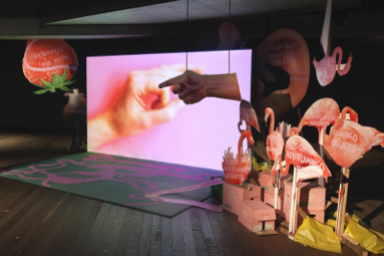
Heather Phillipson’s ‘Put the Goat in the Boat and Serve it Hot’
MONA Museum of Old and New Art, Hobart, Australia
Advanced Video and Time-based art Studio - Fine Art Studio 2 and 4
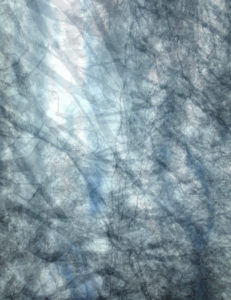
ANDREW GUNNELL, Untitled 2018 Digital Inkjet
Alchemy: Technique, Mediation and the Artist's Response - Fine Art Studio 2
Through practical workshops this course introduces and explores a range of processes and techniques of lithography and etching as a medium that extends and compliments drawing. Using reproductive techniques with their inherent alchemy, history and transformative principles students will explore and develop strategies to respond to unintended results and the mediation of the medium with consideration of their idea. Students will be encouraged to find an alternative directions in order to produce new artworks while developing a generative art practice.

Photograph of Rachel Whiteread's studio by Nigel Shafran 2010
Drawing Atelier - Fine Art Studio 4

Copyright Arelene Texta Queen, Speak no, Year, 2017 felt tip pen on paper
Drawing Identities & Transformation - Fine Art Studio 2
In this course you will further develop your Drawing practice as a broad-based contemporary art form. You will strengthen your skill base and test how drawing practices extend beyond the studio to both employ and transform identity. You will explore identity and transformative practices in relation to new ways of making and installing a range of works. A selection of initial themed projects will lead to you developing a self-directed and resolved body of work.
To gain experience, skills and knowledge in developing a career as a professional artist you may participate in a collaborative Exhibition Project. Students in this course will share tutorials and resources with the Drawing Atelier course. Additional lectures, skills demonstrations and gallery visits will demonstrate how contemporary artists employ drawing concepts and methods that directly extend their studio practice.
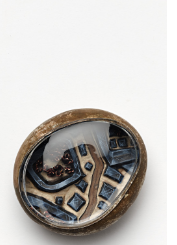
Stephen Robb
Cell series (object), 2012
Acrylic, copper, shibuichi, acrylic, paint
Gold & Silversmithing Narratives - Fine Art Studio 2
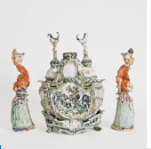
David Ray,Wild Thing,
2017, Earthenware, 66 x 66cm, Photographer: Artist
Making Ceramic History Present - Fine Art Studio 2
Using the esteemed ceramic collection of the National Gallery of Victoria as a starting point, students source an object that peaks their imagination, passion or curiosity. This ‘historic’ and/or ‘significant’ object is the conduit for a conceptual and technical research. Students will be encouraged to develop an individual approach and interpretation to develop new work, utilising a range of ceramic techniques.
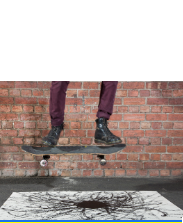
Performprint 2016, Out of the Matrix Exhibition, Image courtesy of Tobias Titz
Out of the Matrix - Fine Art Studio 4
In this course you will explore the unique possibilities offered by the Matrix for duplication, multiplication and the unique through experimenting with reproductive technologies. You will utilise a range of technologies and materials, including digital, intaglio, photographic and/or serigraphic processes to diversify your options for print production. You will deepen your analytical thinking and making skills through the combination of conceptual and technical development. In consultation with your lecturer, you will take responsibility for the determination of your study program through set assignments with a major self directed studio project.
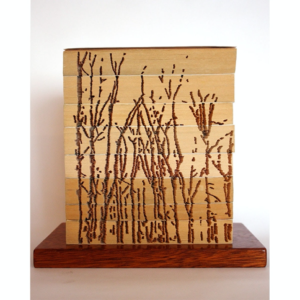
Kylie Stillman 'Big Picture' 2020
Hand-cut paperback books and timber base
Collection of Town Hall Gallery, City of Boroondara
Painting, Narrative and Place - Fine Art Studio 4
"In this course you will be introduced to historic and contemporary art practices that approach the concept of storytelling and setting. With a focus on both abstract and representational forms, the course will examine the diverse ways in which artists engage narrative interpretations from individual experience to shared stories, whether real or fictional. Through studio- based investigation you will explore works that respond to content that articulates representations of place: incorporating the real, imagined and virtual.You will consider the history of painting and its influence on the production of contemporary narrative. Investigate the role of the internet on the discipline of painting and explore the networks and narratives between place and paintings, online and in real space.
You will be encouraged to explore the medium of painting and related media, as a means of visual mapping, storytelling, communication and the translation of non-visual content into individual art works. You will experience working in series, exploring both reductive and expansive strategies of studio production. You will respond to a range of thematic projects that will lead to independent self- directed outcomes in a variety of media. You will gain experience, skills and knowledge in developing a career as a professional artist through an Exhibition Project, where you will curate, exhibit, critique and document your work in a collaborative theme- based group exhibition. You will experience individual tutorials, peer-to-peer discussion and group feedback sessions, online learning, demonstrations, health safety and proposal writing for professional practice and student presentations.
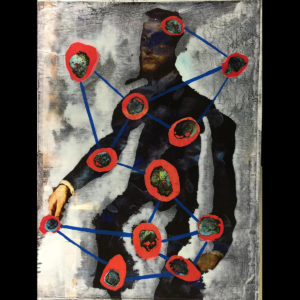
PETER ELLIS, TITIAN’S GHOST, 1998, SYNTHETIC POLYMER EMULSION, GOUACHE, COLLAGE ON CANVAS PANEL
Painting Transformations - Fine Art Studio 2
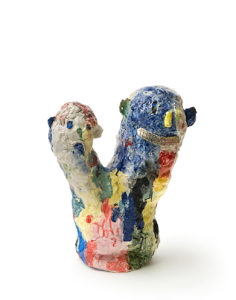
Samantha O'Farrell, 2018 Porcelain 45cm x 40cm Diam. Photographer: Andrew Barcham
The Ceramic Vessel as Political or Social Commentary - Fine Art Studio 4
This course explores the contemporary ceramic vessel and how the vessel responds to socioeconomic, political and environmental conditions. Students will explore and experiment with different ceramic forming techniques and surface finishes in relationship to concept.

LISA WALKER, PLAYMOBILE, PLASTIC, COTTON THREAD, 2010, COLLECTION NATIONAL GALLERY VICTORIA
The Ready Made in Gold & Silversmithing - Fine Art Studio 4
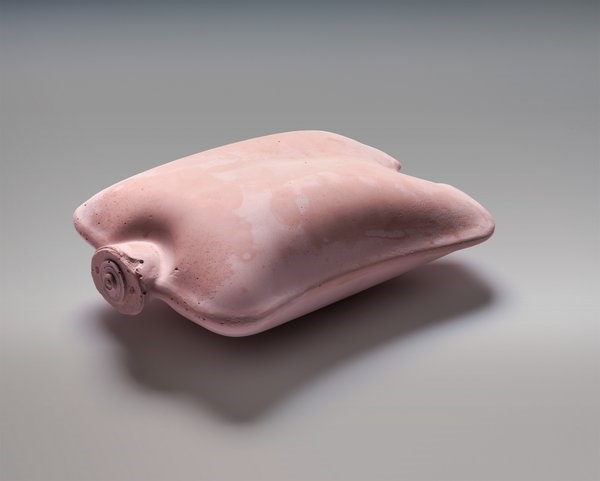
Rachel Whiteread Untitled (Pink Torso), 1995 © Rachel Whiteread
Photo: Seraphina Neville and Mark Heathcote © Tate
Thinking Through Making 1 - Fine Art Studio 2
This course aims to further develop your sculptural practice by focusing on an individual and hands-on approach to making. You will begin the course by creating and documenting a series of works without predetermined outcomes in relation to a series of themes. This will allow you to be productive in an intuitive and creative way and build a deeper understanding of your own interests. In response to this work, you will research and document a series of artists, works and ideas and begin to build an archive of research material to draw on in the future. In the second half of the course you will use these early works, research materials and ideas to develop and present a major work or series of works.
This course aims to provide you with the tools to begin to develop conceptual directions that you can expand on as you develop your practice.
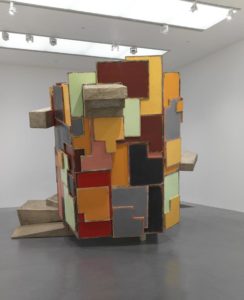
Phylidda Barlow, untitled: "upturnedhouse", 2012. Collection Tate / National Galleries of Scotland
Thinking through Making 2 - Fine Art Studio 4
This course aims to further develop your Sculptural practice by focusing on an individual and hands-on approach to making. You will begin the course by creating and documenting a series of works without predetermined outcomes. This will allow you to be productive in an intuitive and creative way and build a deeper understanding of your own interests. In response to this work, you will research and document a series of artists, works and themes or ideas and begin to build an archive of research material to draw on in the future. In the second half of the course you will use these early works, research materials and ideas to develop and present a major work or series of works.
This course aims to provide you with the tools to consolidate your work to date and to assist you in developing directions that you can potentially expand on as a professional artist or in further study.